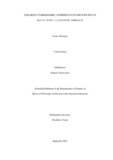
Please use this identifier to cite or link to this item:
https://hdl.handle.net/20.500.14301/140| Title: | EXPLORING STAKEHOLDERS’ EXPERIENCES OF PARTICIPATION IN SOCIAL AUDIT: A CASE STUDY APPROACH |
| Authors: | Bhattarai, Pranav |
| Citation: | Bhattrai,P.(2020)Exploring stakeholders’ experiences of participation in social audit: A case study approach. |
| Issue Date: | Sep-2022 |
| Publisher: | Kathmandu University School of Education |
| School: | SOED |
| Department: | DODE |
| Level: | M.Phil. |
| Program: | MPhil in Development Studies |
| Abstract: | A qualitative research design with a study approach was employed to explore stakeholders’ experiences in the social audit process. Existing literatue, policies and guidelines on social audit have narrowly defined its concept and significance on participation of the key stakeholders in the process. The research has identified layers of influence that worked as negatively as barriers or positively as enablers for participation in the social audit process. The School’s culture of organizing social audits regularly enabled the participatory process. A positive relationship was observed between institutional culture of participation and stakeholder’s motivation to take part in the social audit process. However, a poorly designed social audit process was a barrier. Gaps were identified in setting basic rules and protocols of the social audit process. Inadequate prior communication, sensitization and information sharing among stakeholders as part of the basic protocols of the institutional design process have negatively affected the participation. Thus, the poor institutional design process of social audit worked as a barrier to meaningful and constructive participation of parents and students. Another key barrier to equal participation was identified as knowledge asymmetry among stakeholders. Research participants felt that knowledge asymmetry affected their chances of participation in the social audit process on equal footing. According to Challies et al. (2017), participation and engagement in any context lead to betterinformed decisions only when there is a wider range of information inputs and knowledge exchange among stakeholders in the process. Resource asymmetry (unequal socio-economic) performed the role of a barrier to equal participation of a certain group of stakeholders in the social audit process. The context of resource asymmetry and unequal power relations generated by it has been a strong barrier for parents and students. My findings indicate that when stakeholders don’t belong to symmetrical socio-economic backgrounds, it tends to create unequal power relations among them. Prevalence of such unequal socio-economic status disempowered a group of participants from actively participating and engaging in the process while significantly leveraging the other group. The overall findings, thus, confirm to the Theory of Participation by Challies et al., which claims that the overall participation and the experiences of participants are either influenced by institutional participatory culture or the design process of social audit, knowledge asymmetry and socio-economic context. Based on the findings discussed above, some conclusions are inferred. Physical participation of stakeholders was ensured but with no collaboration and consultation among them. This indicates a phenomenon of a ritualized form of participation devoid of consultation and two-way exchange of ideas and thoughts. Arnstein (1969) calls this type of participation a kind of ‘manipulation’ by power holders who invite participants only for listening and to fulfil the functions of rubberstamping members in the committee. Social audit is a civic engagement tool that serves as a forum where teachers, parents, school management committee can discuss issues collaboratively to find solutions to school problems. However, this potentiality has remained largely untapped because of a ritualized form of stakeholders’ participation in the social audit. From the findings, it can be inferred that ritualized practice of social audit has limited active and meaningful participation of stakeholders. Similarly, findings also reinforce a strong connection between resource asymmetry (socio-economic status) of participants, which has limited two-way collaboration with inactive participation, which attest to the reality that if there are significant power/resource imbalances between stakeholders (Ansell and Gash, 2008), important stakeholders cannot participate in a meaningful way. |
| URI: | https://hdl.handle.net/20.500.14301/140 |
| Appears in Collections: | Dissertations |
Files in This Item:
| File | Description | Size | Format | |
|---|---|---|---|---|
| Pranav Bhattarai_MPhil_KUSOED_Clean Version_October 23.pdf | 1.15 MB | Adobe PDF |  View/Open |
Items in DSpace are protected by copyright, with all rights reserved, unless otherwise indicated.